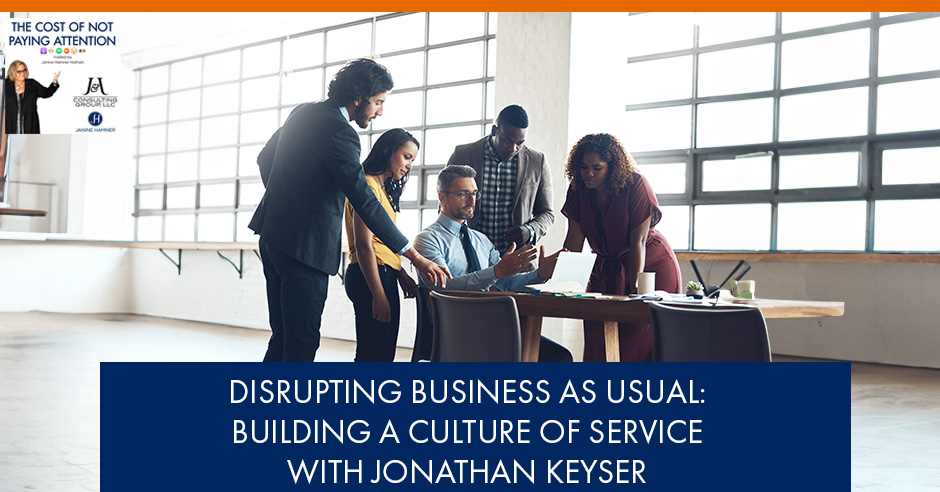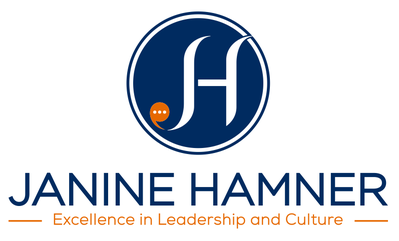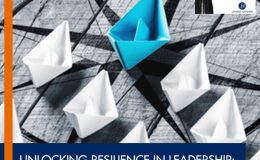
Jonathan Keyser, the visionary founder of Keyser Commercial Real Estate, shares his powerful blueprint for creating a mission-driven organization. In this episode, Jonathan takes us on a journey through his transformation from a traditional, cutthroat approach to business to one rooted in selfless service. Discover how he is revolutionizing the real estate industry, one act of service at a time, and how his principles can be applied to transform your business or industry as well. Whether you’re a seasoned entrepreneur or just starting out, this episode will inspire you to rethink your approach and embrace a more purpose-driven path to success.
GUEST: Jonathan Keyser | LinkedIn | Visit their Website: Keyser
HOST: Janine Hamner Holman | [email protected] | LinkedIn, Facebook, and Twitter | Subscribe to my Newsletter! | Book me to Speak!
—
Listen to the podcast here
Disrupting Business As Usual: Building A Culture Of Service With Jonathan Keyser
Introduction To Jonathan Keyser And His Transformation
I am excited about the conversation that we’re going to have on this episode with Jonathan Keyser. He is the founder and managing partner of Keyser Commercial Real Estate, which has become the largest commercial real estate firm of its kind in Arizona. He was named The Commercial Real Estate Disruptor by USA Today. He is a number one Wall Street Journal bestselling author for his bestselling book, You Don’t Have to Be Ruthless to Win.
In his own words, Jonathan used to be a ruthless, cutthroat, and take-no-prisoners commercial real estate broker. He found a different way. He reinvented himself. That reinvention has created the aforementioned largest firm of its kind in Arizona, all around this idea of success by helping others succeed. Jonathan, what is one thing that you have realized either within your business or with your clients, that they were failing to pay attention to? What’s the problem that that inattention was causing?
First of all, thank you for having me on. I love what you’re doing and I appreciate the work that you do. It’s a pleasure to be a part of it. I also appreciate the kind words. I’m just a guy like everybody else. Right now, I’m struggling with allergies. That’s why my eyes are watering. We have stumbled across a way of doing business. It’s very unique and it’s something that we want to share with the world. It’s around this idea of selfless service.
Your question is a perfect one because what I do requires paying attention. To be able to serve someone, you have to be able to be present and pay attention. When you talk about the cost, I had this realization many moons ago, as one example. I have dozens of them, but when I was meeting with someone, I was focused in my head on what I wanted to get out of it, on stuff that may be happening at home, or other worries and concerns that I had. I wasn’t present to the individual.
As a result, I missed a lot of the opportunities that came my way to get to know them better, learn and dig into their stories, learn about them, and find ways to be of service. To me, the cost of an intention is massive because if you’re not paying attention, you’re not present, and you’re not picking up on the subtleties of a conversation that could lead to ways to help people, you’re missing the biggest opportunity in front of you, which is that person right in front of you.
To truly serve someone, you must be present and pay attention. The cost of not doing so? Missing the biggest opportunity—the person right in front of you. Share on XI love the question because it’s one that we don’t have in today’s haphazard, super-distracted, and everybody thinks they have to multitask world. There is something to be said for being present, being with someone, and looking to find ways to help that person in that interaction.
You’ve built your firm on this idea around selfless service and authentic connection. I’m curious, when you are bringing new real estate folks or new advisors into the firm, are you looking for people who already have that or are you looking for people who resonate with it enough and then you bring it out in them? As many of our audience may know, the real estate world is not known to be this make long-term connections or play the long game place.
It is a dog-eat-dog world. It’s not entirely dissimilar from car salesmen. It is the way that we often think about real estate agents. I’m curious, when you are looking to bring people into Keyser, are you looking for somebody who has already got it or for somebody who has the seed of it that you can nurture?
You ask great questions. That’s an amazing question. It’s very insightful because it dives into the crux of what I do, which is if I am an individual who used to be a shark that has decided to change and is now a poster child for trying to do business differently.
Which you are. You used to be a shark.
If that’s the case, then as that individual, part of me believes strongly in the rehabilitation model. There’s a big but. I’ve learned a lot in this journey since I started this company in late 2012 or early 2013. We originally designed it to be a safe haven for anyone who resonated with the message. It was like, “Come one, come all. It’s not fun to be in a traditional firm. We’ve created a safe and happy environment. Come on board.”
What we found over time, and the pandemic accentuated this, is that a lot of people were giving it lip service because we were having much success. They weren’t living the Keyser principles of selfless service in their day-to-day interactions. This is a little bit sobering as a founder because, on one hand, nobody is perfect, myself particularly included. It’s not like you want to be that judgmental person running around whacking fingers with ruler sticks if they’re not being sober.
“You’re not walking the talk, you little hypocrite.” Exactly.
We can all find areas where we’re not, however, it did become inherently clear that the amount of people that we were able to rehabilitate was zero. I believe now on the other side of that. You mentioned that seed. I want that seed. I want someone who this is how they operate and they haven’t been able to succeed because they’ve been trampled.
Typically, when you are nice in commercial real estate, you get trampled. One of the things that I would say in the past is, “Nice guys can win here at Keyser. We could get ahead by doing business the right way.” That’s what we look to attract now. We look to attract people who are already trying to operate this way but don’t have the team, the methodology, the framework, the structure, or the partnership around them to help them be successful.

Culture Of Service: In business, nice guys can win—if they find the right environment where doing things the right way is valued and rewarded.
Those tend to be amazing fits. We brought a mid-level-aged guy on board. His name is Brandon and he is perfectly wired for our business. He loves to help people and he cares. Those are the people that we look to bring on board now. We can always teach somebody the process. It’s hard to try to get a heart transformation. You have to want it or you don’t.
That’s what I was thinking because I know enough of your story, both from your amazing book and from our pre-episode chat. You grew up as the child of missionaries, so you have the seed of selfless service already in you. I’m now telling your story for you. You then moved back to the US and were not having a whole lot of fun.
My mother is the child of a minister, so I know what that life is like. There wasn’t a lot of money and it was hard. You didn’t have the same stuff that your friends had, “This being poor stuff is for the birds. I’m out. I’m tapping out of this. I’m going to go make a bunch of money.” In the US in the ‘80s and ‘90s whenever this was happening, the way to do that often or certainly, our mythology says, is to pull yourself up by your own bootstraps and stomp on other people to get there.
What was happening though is you were making a bunch of money, but you weren’t living in accordance with who you are. That was the dissonance that was happening in your life. As I remember the story, you were hearing somebody speak and you were like, “Maybe there’s a different way to do this.” Do I have that correctly?
You’re good. You are not missing things. I have to figure out how to hire you. You’re fantastic. He was a speaker, probably not that different from someone who is tuning in to this. Mine was an in-person and a speaker was talking about a different way of doing business. I’d never heard anything like it. It moved and inspired me. He sounded like my parents. It’s this whole idea of what if you helped a bunch of people and got ahead.
I went up to him afterward and said, “Is that true? Does that work or is that just a clever schtick that you use to get business?” He walked me through it. He said, “No, the universe cannot handle an imbalance. The more that you give, if you play the long game, the more that you get.” That sounds so simple. I said, “If this is true, how come no one I’ve ever heard of does this? Why is this the first time I’ve heard this?”
The Long Game Of Selfless Service
My parents tried the whole selfless service thing and they’re broke. I don’t know how it works. He said, “It’s a process and it takes a while. You have to stay with it. You have to play the long game.” You used that term earlier. That’s exactly what he said. I decided to reinvent myself and it was a long hard road. You and I talked about it before. This isn’t instant gratification and get rich quick. If you want that, hang up now. This is not your spot, but if you are interested in long-term sustainable success, I believe there’s no better way to do that than by loving and serving other people.
Long-term success isn't about instant gratification. It's about loving and serving others, even when the rewards take time to come. Share on XAt the end of the day, I’m in commercial real estate. You commented something earlier that I want to go back to, which is how cutthroat it is. A lot of times when I speak, I’ll do these keynotes. That’s the other thing. If you want to write a book, then all of a sudden, you become a speaker, there’s all that’s involved in that. Think twice about that before you jump in because being on the road speaking is not a fun gig all the time.
Anyway, I digress. When I speak, a lot of times I’ll start with, “Everybody, imagine in your mind the person in the world who you trust the most. The one who loves you the most and that you trust the most, just that person. Now, raise your hand if that’s your commercial real estate broker.” Everybody cracks up because it’s absurd that it would be your commercial real estate broker that you pick over your mom or whatever.
I’m in an industry that’s known for being a shark tank. I’m not saying that it doesn’t pay to be a shark. That has worked for hundreds of years or thousands of years. There’s plenty out there. I used to be one. It worked for me but with the dissonance that you described, I was so misaligned with my core values. I was behaving very selfishly.
People always say, “What do you mean by ruthless?” It’s not like I was doing illegal stuff, but I was doing everything that was about me. It was like if I can talk to my client, I represent tenants and occupiers of commercial real estate. If I can talk them into doing a longer-term deal, I get a bigger commission. Guess what my advice was, “Do a long-term deal.”
I was advising things that weren’t in the best interest of my clients because it was self-serving. That’s where that difference came. Once I decided to change and start helping as many people as possible, it was like a miracle, but a very long one. The thing about what I do is that it truly is a long game. It’s helping hundreds and thousands of people while asking for nothing in return. Most people aren’t willing to do that.
You have to have a heart that wants to, which goes back to your other question. This methodology that I teach won’t work if you don’t have the love of people. You don’t care about people and you’re just doing this to make money. You’re saying, “Maybe JK has a clever little manipulation.” This isn’t that. This is about a heartfelt and sincere desire to help and serve as many people as possible. When you do that in a sustained way, the kinds of benefits that come your way, both on the financial side and non-financial, are extraordinary.
My life is so rich because of the friendships, the relationships, and the people. We’re a community. We all try to help each other. What a cool thing. Rather than trying to step on each other and take from each other, we’re trying to build each other up. We’re trying to help each other. By the way, we pay the bills in the process. To me, it’s the best of all worlds.
Imagine a world where people selflessly help each other, regardless of personal gain, understanding that it’s in their own personal best interest to do so. As I like to say a lot, “Selfless is selfish.” Being selfless is self-interested. The more selfless you are, the more self-interested you are in behaving, whether that’s in your personal life or your business life.

Culture Of Service: Imagine a world where people selflessly help each other, knowing it’s in their own best interest to do so.
What I teach in my book is the how. We all know how to love people but how do you make money doing that because my parents didn’t? How have I figured out how to do this? What’s the secret sauce? That’s what we put in the book so that anybody in any business could pick it up and say, “I can see how I can put this to work immediately to be successful for myself.”
If there are people who are out there who are tuning in to this conversation right now and they’re thinking, “I like what this guy is talking about. A) Run out and buy Jonathan’s book You Don’t Have to Be Ruthless to Win. B) Hire him to come and speak if you have an organization that brings in those kinds of resources. Can you give us some high-level how-to’s?
If you were going to boil it down and say, “What’s the one meaningful takeaway if you took away nothing else?” It would be this. In whatever business you’re in and wherever you’re trying to get revenue, whether that’s a client or contract, whatever. Unless there are zero people involved, which would maybe happen in the future.
Maybe it will with AI. I don’t know.
How To Serve Without Expectation
We’ll see. There are people making decisions and those people are human beings. When you have conversations, whether that’s in person, through Zoom, or on a phone call with potential clients, rather than focusing on your objectives for that conversation and what you can get out of it, focus instead on being very present.
Ask good questions to get to know them well and identify needs, and then follow up on those in a way that’s selfless. When I say needs, I don’t mean like, “I identify that this person needs my services.” That’s not selfless. I’m talking about figuring out multiple ways to be present with them. Helping somebody feel heard is a gift in and of itself. Few people feel that today. There are countless ways.
If you’re in a meeting, whatever your schedule looks like, don’t change anything else other than when you have those conversations over the next week, instead of thinking, “What do I need to get out of this?” Think, “How do I push as much value across the table to everybody else?” You’ll be surprised at the quality and the caliber of relationships that are created quickly. Stephen Covey calls it, “The speed to trust.” It’s amazing how selfless service leads to speed to trust. You’ll be amazed at the potential value-creation opportunities you unlock. That’d be a quick and easy one. In your next meetings, flip it from, “What can I get?” to “How can I serve?” and see what happens.
“What can I get?” to “What can I give?” I was talking with a client earlier and we were talking about deepening relationships with, “You know this. You have a list of 200 people on it. You have your 20 core people, and then you have your 20 people in your next circle out.” He was essentially the CEO of the company and was essentially saying, “I know the people that I know.” I was saying, “What are other ways that you can find out things about them that they may not be sharing in your coffee, your dinner, your cocktail, or whatever?”
I said, “What if you connected with them on Facebook, Instagram, or places where people are more likely to be sharing about their families or their friends or other kinds of challenges? You could then think, “Your kid got into this school or your kid is having this challenge. My kid had that challenge,” or “You’re sending your kid off to the first day of school. I remember when it was my kid’s first. That was so hard.” You then have these other kinds of touch points that you can create with people.
The cool thing about that is you’re getting into their world. You’re caring enough to make the effort to learn more. I love to do that in person because, in an in-person conversation, you can extract things that are far deeper and less superficial than what anybody posts, but starting with posts is a good idea. The thing that I want to make sure that I reiterate though is that there are always people that listen to me through the tactical lens. This is tactical.
I go do this then I will ask. I’m describing a state of being of service. What exactly that looks like in a moment, I could never predict in advance. What do I say? I’m going to say, “Here’s what I can tell you. I don’t know what you should say because I won’t be there with you. What I can say is if you’re present or if you’re coming from a state of being of selflessness towards this person, what you need to say or ask at the moment will show up.”
You will know.
If you try to manipulate this where it’s just a tactic or just a clever research of a prospect, it’s not the same because people can feel that. They can sense it. They can see through that artificial nature of that. That’s what everybody does anyway. Everybody was always trying to do gimmicky stuff like, “I saw they play golf, here’s a golf club.” That’s not necessarily clever. Clever is like, “I figured out your mom has a rare disease. I went and figured out the best doctor in the state and got you connected with him.” That’s value.
That is a big value. I’m curious what your thoughts are about the books like Bob Burg’s The Go Giver or Adam Grant’s Givers and Takers.
The Balance Between Serving Others And Self-Interest
The only thing I would say about Adam Grant’s book is I used to love that book. It’s one of the ones I referenced in my book. As I’ve evolved with my methodology, and I said this in the presentation with a bunch of bank CEOs, I don’t believe in the term takers anymore. I think that everyone has a little taker in them. The whole point is to find that balance between looking out for your needs and your self-interest and throwing yourself into the service of others.
We all have a bit of ‘taker’ in us. The key is finding balance—looking out for our needs while also serving others selflessly. Share on XSome people have it skewed. Usually, maybe the more assertive people or the more type-A personalities, they’re more likely to be more proactive about their service requests. It doesn’t mean that they’re necessarily a taker. One of the things that I said was, “What do you do when you experience a taker? Here you are saying help everybody.” They said, “What do you do?” I said, “There are two important distinctions. Number one is service always has to be a free-will choice. If anybody is telling you to serve, or if you’re even telling yourself that you have to serve, that’s no longer service. That’s an obligation. That’s a duty. That’s not what I’m talking about.”
If we’re coming from a place of I get to choose. There are infinite needs in the world. We have limited time. We have that and we’re already, without realizing it, making decisions on what we’re doing anyway. We’re deciding where and how we serve. With that being completely and utterly okay and saying no to one is acceptable. It doesn’t mean you’re not a person of service or any of those things.
“I just choose not to serve you.”
“I choose not to serve you. Thank you for the opportunity to serve and I’m going to pass.” There’s nothing wrong with that. The other thing that I would say is that it also provides tough love if you experienced a taker and you care about other people.
I was going to say, “He’s about to come in with tough love. I can feel it.”
Tough love the shit out of them, “I can’t introduce you to my clients. Do you know why? It is because you’re a shark and I can’t do that to them. Until you change, I can’t help you, but I can help you by telling you what’s ugly and what you need to fix.” They don’t always love that conversation. You have to decide if it’s worth the relational risks to do so.
I have found that to be a very productive conversation. It has helped to transform a lot of people that needed a jolt out of reality. Honestly, that’s why I said I don’t know if I believe in takers anymore because most people feel desperate to get ahead like I did. They don’t think of it through the lens of I’m trying to take advantage of somebody. They’re like a drowning person trying to find something to save them out of the water.
At the end of the day, if we give people grace, if we give people generosity of spirit, and we give them forgiveness and acceptance, we’ll realize that we’re all not that different anyway. All this hate, rage, and polarization in the world are so unnecessary. We’re all trying to make it through this crazy thing called life that nobody gave us a manual of. Now, we’re arguing over whose manual is right. To me, it’s nuts. Just love and serve people.
That’s a lot easier said than done. We are at this ancient curse. Maybe you live in interesting times. We are in these super interesting times right now. I got canceled last Friday. I was supposed to do a keynote and I ended up being canceled and told I was too controversial. I am working on how to bring grace to that lost opportunity. How do I bring grace to myself? How do I let them off the hook that I put them on for canceling me?
I put myself immediately on how much of that was my fault. If I want to say it’s my fault for being authentic and transparent about who I am and what I stand for, then all of it was my fault. I’m not willing to change any of that. There we are with that. Ultimately, I got to decide these people weren’t my client. They were mistaken in reaching out to me and I was mistaken in accepting it. Now, we get to move on. We are living in this world. We’re in this time. I wasn’t planning on talking about that at all here, I’m realizing I’m getting a little flushed as I’m talking about it.
It’s a present for you.
We are in this super polarized moment in time where anything somebody says could lead to them being canceled, ousted, outed, or whatever construct we want to think of it in. That’s super challenging. What I love about you and what I love about this conversation is that what we are encouraging people to do is to be genuine, to be authentic, and to come from their real values. How do we want to treat people? How do we want to be treated and how do they want to be treated? To meet people where they are, to come at it with love and selflessness. Sometimes we get smacked down in that journey. I’m curious for you, how do you create resilience when you get smacked down by that way of being?
Do you want to dance?
Yes.
Here’s what I would say. I don’t know the specifics of your situation and I don’t want to know the specifics of your situation in that cancellation that you talked about. I’m sure that I have had many other scenarios, similar or dissimilar but equally frustrating on a lot of different fronts as I’ve been through my career. I’m speaking from that experience, not from “I know this situation.”
Resilience In The Face Of Challenges
What I would say is these kinds of opportunities are the perfect opportunities to grow yourself and to learn how to extend true love, gratitude, and acceptance to extremely frustrating situations that don’t go your way. There’s this guru, Byron Katie, who I’m very much a follower of. She talks about loving what is, accepting what is, and looking at it as a gift versus being frustrated by it.
I am nowhere in shape or form a guru. I get frustrated by plenty of things. I like being frustrated by things. It keeps me sharp sometimes. One suggestion would be, if it’s not serving you to be frustrated in this moment, to extend the same level of, “This is when it matters. The microcosm of service and love is when you don’t want to.” It’s easy to go when you want to. That’s not what we are talking about.
When you’re delightful, of course, I want to be of service.
I have found that in loving the situations, in loving the people, in loving this and accepting with love what occurred, not as a begrudging acceptance of reality, but rather as an embrace of the beauty of the self-determination of humanity and how life offered you this gift. That for me is how I experience less suffering. Whether or not it’s true, whether I’m tricking myself or not, it doesn’t matter because I’m not suffering. I don’t like to suffer. Suffering sucks. Pain is voluntary and suffering is very voluntary. I prefer not to suffer. On the other hand, I also am a big believer in not tucking my tail between my legs.
There’s also a real part of me that doesn’t run around being afraid of those kinds of things. It’s not useful for my life. I am love, I am service, I’m authentic, but I’m also a tough guy. I’ve been through a lot. I’ve experienced a lot and you asked me a question about resilience. How do you develop resilience? Get up the next morning, no matter what happened the day before. Go and meet the day with as much energy and ferociousness as you can and never give up.
I’ve had a few people who know me well say that the biggest thing about me. I’m not saying this is true. This is what people have told me. I’m only saying this in response to your question, not as a self-accolade, but I’ve had more things happen to me than most people that would have been discouraging or debilitating that I could have allowed them to wreck my life.
I choose, “No.” I get up the next morning and I say, “That was a tough day yesterday. All right, what are we doing today?” I attack it with the same ferociousness and the same love. I found that by never giving up, it’s like the sun. I’ve had a lot of challenges. I’m challenged right now. It’s part of the human experience. It’s part of life.
True resilience is getting up the next morning, no matter what happened the day before, and attacking the day with love and ferocity. Share on XI choose to accept it as well as I can, realizing that I have very little control over it. At the end of the day, I don’t control it anyway. Pretending I do is a delusion. I might as well rid myself of that delusion and avoid suffering. You can avoid pain by staying away from anything that might cause you pain, but that’s like removing yourself. That’s not living. Pain will come if you’re in the middle of any act of living.
The only question is, are you going to suffer? To avoid suffering, I would suggest, as one of many million possibilities, that meeting whatever occurs without resistance can be the most transformational thing a human being does. When I do that well, I live in bliss. When I do that poorly, I turn into this whiny bitchy old person that’s mad at everything that happens to me. I go, “Wait a minute, that’s not who I am. I have to get back to that happy guy.”
One of the things one of the things that I always remember in those moments is we think that we like it at 72 degrees when things are easy and predictable. That’s not when we grow. That’s not when we learn stuff. That’s not when we expand. That’s not when we thrive.
I would even argue it’s not when you’re at your best. Sports is good because it puts you in pressure cooker situations and you have to perform or not. There’s real-time feedback on whether you did or not. That’s why I was saying that I like some, not too much, angst in my life because it gives me a challenge.
It gives you a context.
Otherwise, it’s like, “That’s a beautiful, blessed day.” I’ve lived like that plenty too, but it’s nice to have a little bit where you have to go and then you feel good like, “I get it.” It’s like when you’re working out and you say, “I don’t want to do another set.” You do another set and you’re, “I feel strong.” It’s not that different.
Jonathan, I noticed the time. This has been a delight. I could talk to you all day. I’m going to go ahead and wrap it up. Thank you very much for sharing your heart, for sharing your brilliance, and for sharing your way of being with us. It has truly been a joy and an honor.
It is my pleasure and thank you again for all that you’re doing for the world with this show.
I am Janine Hamner Holman and this has been The Cost of Not Paying Attention. Remember, great leaders make great teams. Until next time.
Important Links
- Jonathan Keyser
- Keyser Commercial Real Estate
- You Don’t Have to Be Ruthless to Win
- The Go Giver
- Givers and Takers
- http://www.LinkedIn.com/company/keyser
- https://www.Instagram.com/keyserco
- https://www.Facebook.com/KeyserCommercialRealEstate
About Jonathan Keyser
 Jonathan Keyser is the Founder and Managing Partner of Keyser Commercial Real Estate, which has become the largest commercial real estate firm of its kind in Arizona. Jonathan is also a Founding Partner of Exis Global, which today has over 580 people worldwide representing exclusively occupiers of commercial real estate. He is also the founder of a small investment fund that invests in emerging technology companies within Arizona, to support and help grow the startup ecosystem in the state.
Jonathan Keyser is the Founder and Managing Partner of Keyser Commercial Real Estate, which has become the largest commercial real estate firm of its kind in Arizona. Jonathan is also a Founding Partner of Exis Global, which today has over 580 people worldwide representing exclusively occupiers of commercial real estate. He is also the founder of a small investment fund that invests in emerging technology companies within Arizona, to support and help grow the startup ecosystem in the state.
Jonathan was recently named “The Commercial Real Estate Disruptor” by USA Today and he is a #1 Wall Street Journal Best Selling Author, for his Best Selling Book, “You Don’t Have to be Ruthless to Win”. He has also been named a “Top Social Capital CEO” by the International Business Times, is a highly sought after keynote speaker, is widely recognized as a thought leader featured in hundreds of articles, publications, and podcasts, and has been named a “Top 20 Virtual Keynote Speaker” nationally.
As an entrepreneur, Jonathan has built KEYSER into an eight-figure firm named recently as one of the Top 50 Most Trustworthy Companies in America by The Silicon Review. Jonathan is also one of the most connected business leaders in Arizona. He is an active member of Greater Phoenix Leadership (consisting of the region’s leading CEO’s), and he is also a member of Young Presidents Organization (YPO), Chief Executive Organization (ceo), and the Million Dollar Speaking Group (MDSG) within the National Speakers Association.
With almost 30 years of experience in the Commercial Real Estate Industry, Jonathan’s firm represents occupiers of space exclusively, both domestically and internationally across a broad range of industries. Jonathan is sought out by companies around the world for his real estate expertise and business acumen. He is particularly good at identifying creative strategies to align real estate with business requirements, designing and implementing unique solutions to complex real estate challenges, and solving Landlord / Tenant conflicts where negotiations have deteriorated in the face of rising hostilities.
Jonathan is happily married to his wife Susanna, and has 5 kids with one on the way. His mission is to change the business community through selfless service, and his entire firm is built upon this philosophy. Jonathan is known throughout the business community as someone who loves to help others, and who goes out of his way to be of service to people across the community.
“As a man’s real power grows and his knowledge widens, ever the way he can follow grows narrower; until at last, he chooses nothing, but does only and wholly what he must do.”
URSULA LE GUIN, A WIZARD OF EARTHSEA





